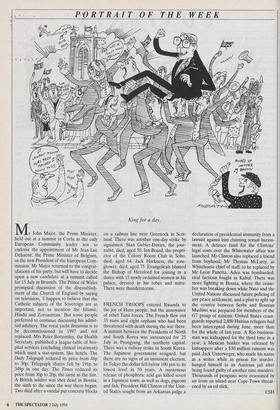t PORTRAIT OF THE WEEK King for a day.
Mr John Major, the Prime Minister, held out at a summit in Corfu as the only European Community leader not to endorse the appointment of Mr Jean-Luc Dehaene, the Prime Minister of Belgium, as the new President of the European Com- mission. Mr Major returned to the congrat- ulations of his party, but will have to decide upon a new candidate at a summit called for 15 July in Brussels. The Prince of Wales prompted discussion of the disestablish- ment of the Church of England by saying on television, 'I happen to believe that the Catholic subjects of the Sovereign are as important, not to mention the Islamic, Hindu and Zoroastrian.' But some people preferred to continue discussing his admit- ted adultery. 'The royal yacht Britannia is to be decommissioned in 1997 and not replaced. Mrs Peter Bottomley, the Health Secretary, published a league-table of hos- pital services (excluding clinical treatment) which used a star-system, like hotels. The Daily Telegraph reduced its price from 48p to 30p; Telegraph shares fell by 191p to 349p in one day. The Times reduced its price from 30p to 20p, the same as the Sun. A British soldier was shot dead in Bosnia, the sixth to die since the war there began. Two died after a vandal put concrete blocks
on a railway line near Greenock in Scot- land. There was another one-day strike by signalmen. Stan Gebler-Davies, the jour- nalist, died, aged 50. Ian Board, the propri- etor of the Colony Room Club in Soho, died, aged 64. Jack Harkness, the rose- grower, died, aged 75. Evangelicals blamed the Bishop of Hereford for joining in a dance with 15 newly ordained women in his palace, dressed in his robes and mitre. There were thunderstorms.
FRENCH TROOPS entered Rwanda to the joy of Hutu people, but the annoyance of rebel Tutsi forces. The French flew out 35 nuns and eight orphans who had been threatened with death during the war there. A summit between the Presidents of North and South Korea was announced for 25 July in Pyongyang, the northern capital. There was a railway strike in South Korea. The Japanese government resigned, but there are no signs of an imminent election. In Tokyo the dollar fell below 100 yen to its lowest level in 50 years. A mysterious release of phosphoric acid gas killed seven in a Japanese town, as well as dogs, pigeons and fish. President Bill Clinton of the Unit- ed States sought from an Arkansas judge a declaration of presidential immunity from a lawsuit against him claiming sexual harass- ment. A defence fund for the Clintons' legal costs over the Whitewater affair was launched. Mr Clinton also replaced a friend from boyhood, Mr Thomas McLarty, as Whitehouse chief of staff, to be replaced by Mr Leon Panetta. Aden was bombarded; rival factions fought in Kabul. There was more fighting in Bosnia, where the cease- fire was breaking down while Nato and the United Nations discussed future policing of any peace settlement, and a plan to split up the country between Serbs and Bosnian Muslims was prepared for members of the G7 group of nations. United States coast- guards reported 2,800 Haitian refugees had been intercepted during June, more than for the whole of last year. A Rio business- man was kidnapped for the third time in a year; a Mexican banker was released by kidnappers after a $30 million ransom was paid. Jack Unterweger, who made his name as a writer while in prison for murder, hanged himself in an Austrian jail after being found guilty of another nine murders. Thousands of penguins were evacuated by air from an island near Cape Town threat- ened by an oil slick.
CSH


























































 Previous page
Previous page